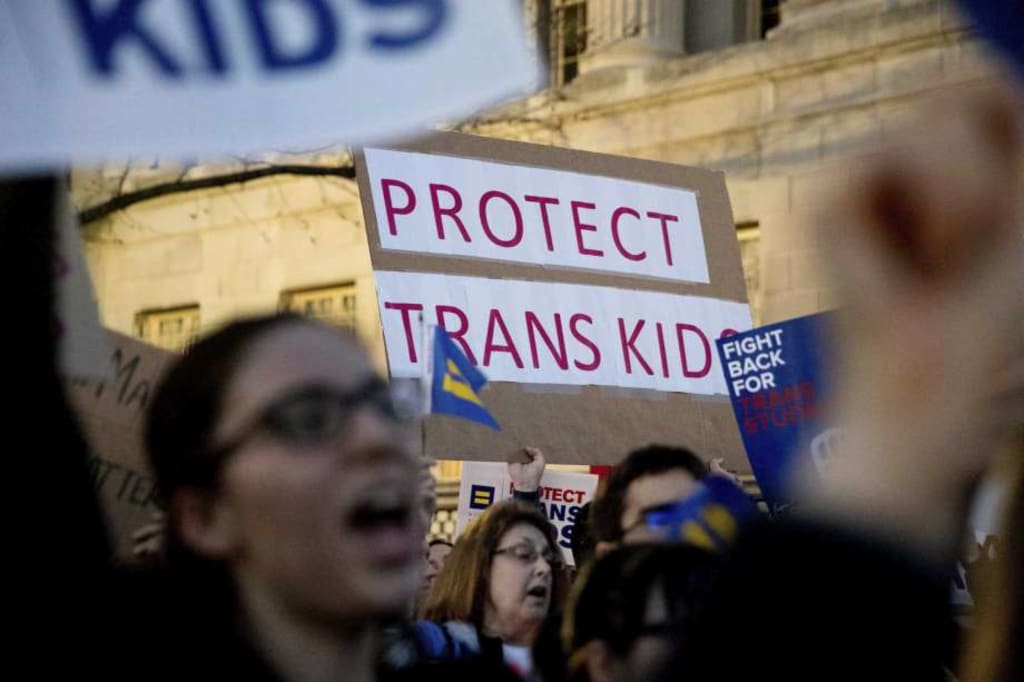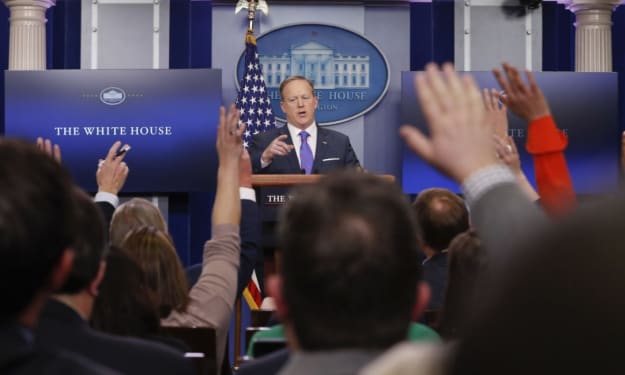President Trump Rescinds Federal Protections For Transgender Students
Decision Deemed A Reflection Of Anti-LGBTQ Sentiment

In spite of claims during his campaign that he would protect the LGBTQ population, President Trump has just done what many consider to be the very opposite: he has lifted the federal protections that were in place to protect transgender students in schools.
Title IX is actually part of the Education Amendments Act of 1972, which states, "No person in the United States shall, on the basis of sex, be excluded from participation in, be denied the benefits of, or be subjected to discrimination under any education program or activity receiving Federal financial assistance."
A Brief History
In May, 2016, the Obama administration, in a joint letter through the Departments of Education and Justice, released a letter that's been referred to as "Dear Colleague," and the letter outlines what the Obama administration believed to be more in line with the spirit of Title IX.
"The Departments," the letter says, "interpret Title IX to require that when a student or the student’s parent or guardian, as appropriate, notifies the school administration that the student will assert a gender identity that differs from previous representations or records, the school will begin treating the student consistent with the student’s gender identity."
Title IX does not require a medical diagnosis or treatment in order that students be treated consistently with the gender identity, which is helpful, but the problem with Title IX is that legal identification under Title IX is often a requirement, and transgender students often have problems obtaining such documents due to state and local laws. In the letter, it was believed that "requiring students to produce such identification documents in order to treat them consistent with their gender identity may violate Title IX when doing so has the practical effect of limiting or denying students equal access to an educational program or activity."
As the Obama administration understood it, "equal access to an educational program or activity" included the right to use the bathroom that aligned with one's gender. It makes sense; a student who either has to make different accommodations regarding bathroom use or who may have to go off campus in order to use the facilities might feel as though they are effectively restricted in how they conduct themselves on campus. People can't effectively concentrate on their studies if they are concerned with where they can go to the washroom without getting into trouble.
What Has Happened
There was a certain expectation that with the Trump administration, the federal protections afforded to transgender students might disappear, and in this case, it would seem that President Trump even ignored what Betsy DeVos, the controversial choice for Education secretary, wanted to do.
An unnamed source spoke with CNNabout the removal of federal protections and said that DeVos shared her concerns with Attorney General Jeff Sessions that vulnerable students would be left unprotected by President Trump's decision. The source also acknowledged that while DeVos recognized that the decision to remove the protections was ultimately Trump's, being against what the president wanted put DeVos in a bit of a hard spot.
As might be expected, press secretary Sean Spicer denied any disagreement between Sessions and DeVos regarding the transgender policy.
The lifting of protections comes just before a Supreme Court case involving a young transgender man fighting for the right to use the washroom that aligns with his gender identity is to be heard.
The national ACLU and its Virginia affiliate sued the Gloucester County School Board of Virginia in 2015 due to the board's policy which stated that trans students could use only single-stall restrooms. The case was initiated by Gavin Grimm, a 17-year-old who was only 15 when his school board implemented a policy that stated he and other trans kids in the county could only use single-stall washrooms even though Grimm himself had been using the boys' washroom for two months prior to the board policy's enactment.
A United States District Court had dismissed the suit put forward by the national ACLU and its Virginia affiliate, while the US Court of Appeals for the 4th Circuit stepped forward and heard the case, ultimately deciding in Grimm's favor.
Grimm's happiness at the appeals court decision was short lived; the school board appealed to the Supreme Court, which is expected to discuss the case sometime in March of this year. The Trump administration's decision to lift protections for trans students will no doubt have some voice in the consideration of the case.
It will definitely have an impact on students like Ash Whitaker of Wisconsin, who has brought a similar case against his own school district. Whitaker said that the way his school treated him is what prompted his case.
Reportedly, Whitaker's school "had forced him to use a separate bathroom from all other students, refused to refer to him as male, and even proposed forcing transgender students to wear a green sticker or wristband to better monitor their restroom use."
A federal court issued a preliminary injunction against the school in that case, and required the school to treat Whitaker as they would any other boy.
While it remains to be seen exactly how the removal of protections for transgender kids in school will affect the operation of schools as a whole, there are advocates speaking out on both sides of the issue.
"This action shows 'due regard for the primary role of the States and local school districts in establishing educational policy,'" the Gloucester County School Board said in a statement through its lawyer. "We look forward to explaining to the Supreme Court why this development underscores that the Board's commonsense restroom and locker room policy is legal under federal law."
"While it's disappointing to see the Trump administration revoke the guidance, the administration cannot change what Title IX means," said ACLU Senior Staff Attorney Joshua Block, adding, "We're confident that that the law is on Gavin's side and he will prevail just as he did in the Fourth Circuit."
The Supreme Court is set to hear Grimm's case March 28.
About the Creator
Christina St-Jean
I'm a high school English and French teacher who trains in the martial arts and works towards continuous self-improvement.






Comments
There are no comments for this story
Be the first to respond and start the conversation.